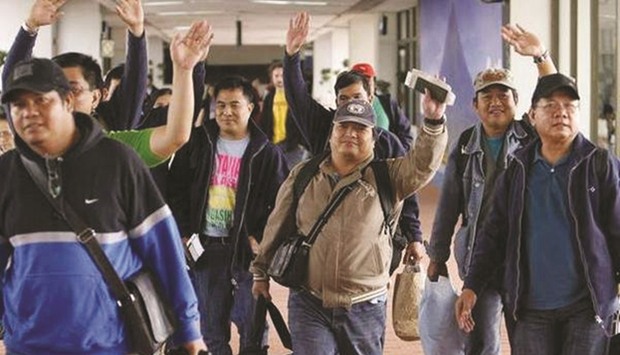Half of Filipinos, or 50%, consider themselves poor, according to results of a new Social Weather Stations survey.
The number is higher than some 44% of Filipinos who described themselves as poor in December, Philippine Daily Inquirer reported.
The poll results showed that at least 1.5mn more families were added to those who describe themselves as poor and 400,000 were added to those who rate themselves as “food-poor.”
The survey covered the first quarter of the year.
It polled at least 1,200 adult respondents. The results showed that an estimated 11.5mn families now consider themselves poor compared to at least 10mn in December.
The same survey showed at least 35% (8.1mn families) rate themselves as food-poor in the first quarter of this year, up from 34% (7.7mn families) in the first quarter of 2016.
The survey had a margin of error of plus-or-minus three percentage points.
Self-rated poverty also rose across areas, the most in Luzon outside Metro Manila (50% from 42%) and the least in Visayas (57% from 56%).
Only the rest of Luzon (41% from 32%) had an increase in self-rated food poverty, while Visayas (33% from 43%) saw the biggest drop.
The median self-rated poverty threshold, or the least monthly household budget needed for a family in order not to be called poor, remained unchanged across areas (P10,000) except in Metro Manila (P20,000 from P18,000).
Median threshold for self-rated food poverty, or the least monthly household budget for food, was also unchanged in the rest of Luzon and Visayas (P5,000) but rose in Mindanao (P5,000 from P4,000) and declined in Metro Manila (P9,000 from P10,000).
Malacanang, reacting to the new SWS survey, said the Duterte administration will double efforts to reduce poverty and raise awareness among the poor of government programmes that are available for them.
Ernesto Abella, presidential spokesperson, said the government is offering services for the poor that are already available.
Abella said the administration is also working with other sectors to reduce poverty.
“Government, therefore, needs to intensify its response in addressing the problem of poverty, with the help of business, civil society and other vital stakeholders,” said Abella.
“It also has to heighten awareness of the programmes and projects of the government in helping the poor,” he said.
He said the government’s “pro-poor” efforts include higher pension for seniors, free medicines for indigents, added incentive and combat duty pay for policemen and soldiers, gratuity pay for job order and contract workers in the government and the regularisation of employees.
The administration, he added, gives certificates of land ownership awards to landless farmers in a bid to end rural poverty. The government also provides machinery and equipment to farmers to help them become more productive. Boats are being provided fishermen, he said.
The government, Abella added, is also increasing spending on infrastructure projects and promoting access to microfinance which would help small- and medium-scale
enterprises grow.

The poll results showed that at least 1.5mn more families were added to those who describe themselves as poor and 400,000 were added to those who rate themselves as u201cfood-poor.u201d
